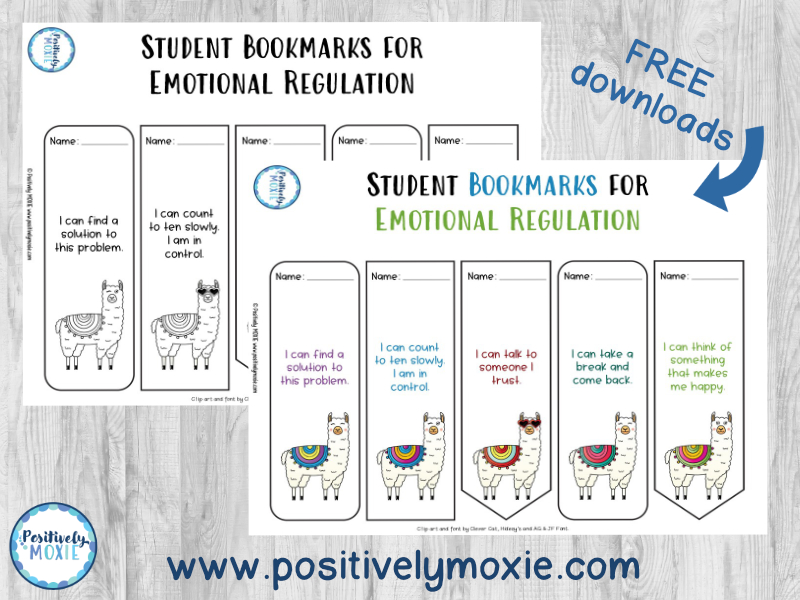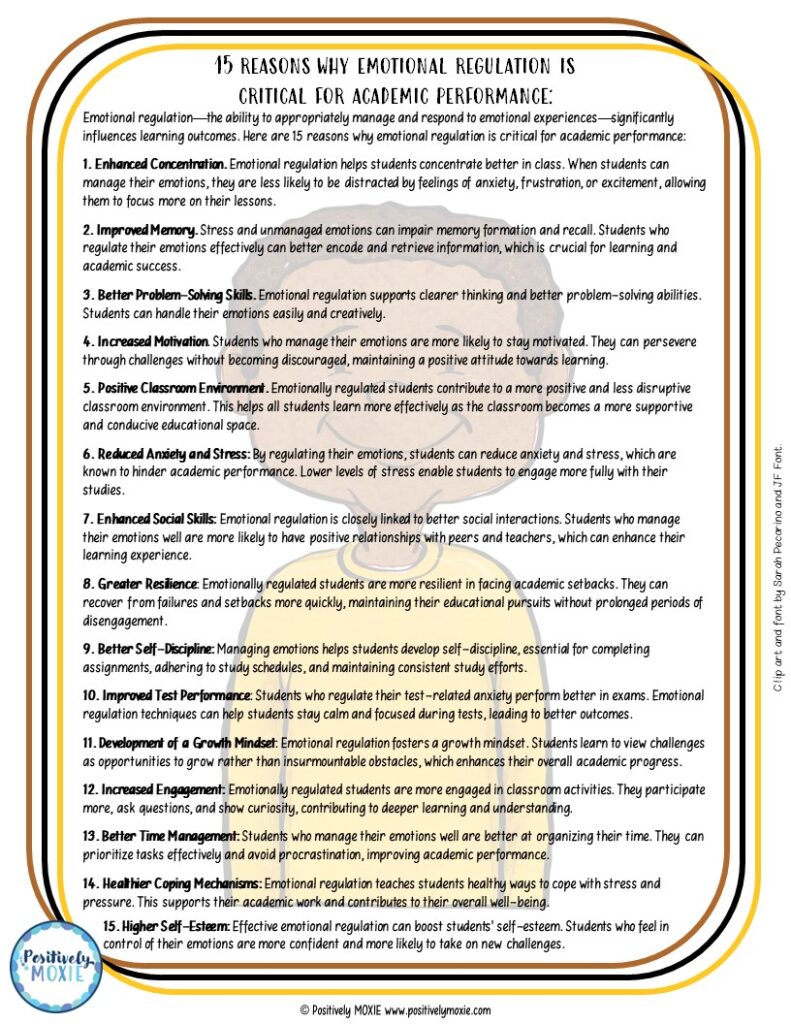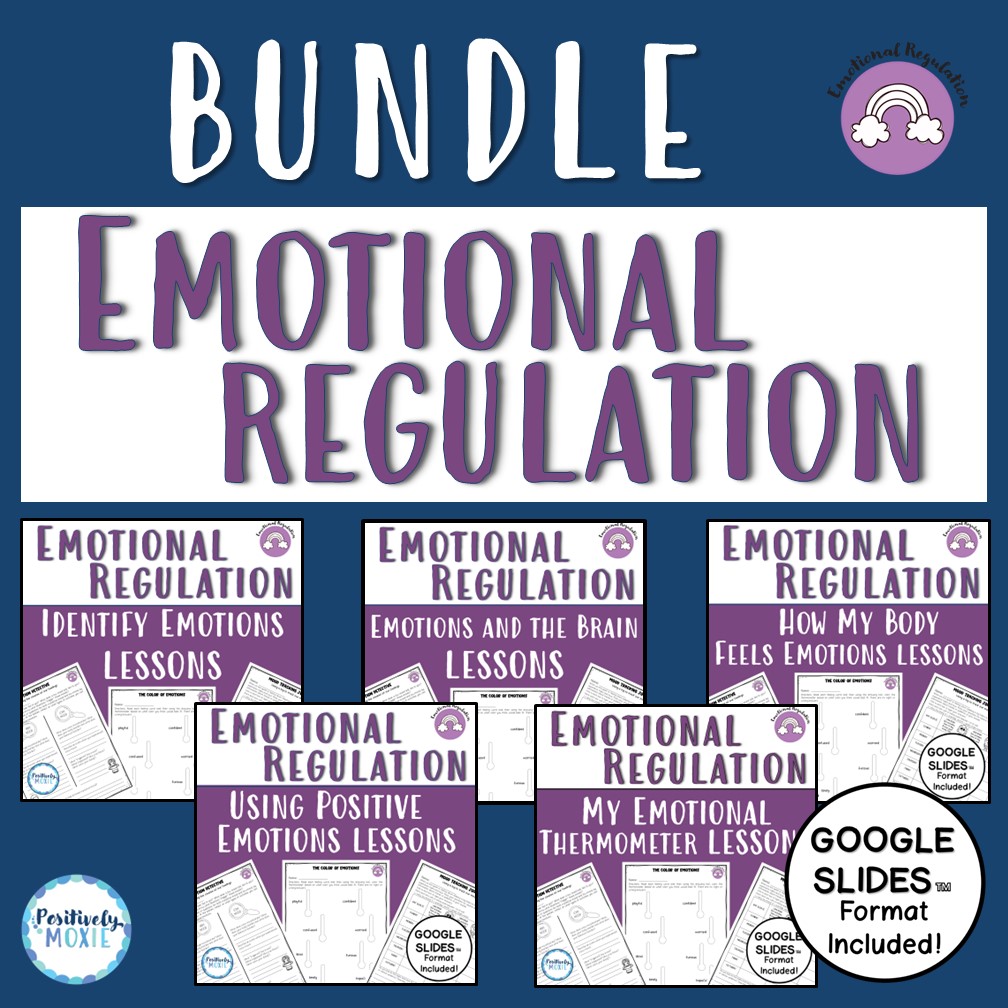
Exploring How Emotional Regulation Impacts Academic Performance
As elementary school educators, your influence stretches beyond transmitting information; you are crucial in molding your students’ academic journey and fostering their emotional regulation and learning. Your mentorship nurtures their intellect and facilitates emotional development, which is intrinsic to their holistic growth. Developing emotional regulation and understanding, which involves managing and grasping emotions effectively, is crucial for success in education. By promoting emotional intelligence alongside academic proficiency, you provide your students with indispensable resources for navigating both the classroom environment and the complexities of life outside its walls.
15 reasons why emotional regulation is critical for academic performance:
1. Enhanced Concentration
When students possess the skill of managing their emotions, they can navigate through situations involving anxiety, frustration, and excitement with greater ease and effectiveness. By regulating their emotions, they can prevent these feelings from hijacking their focus and attention, thus minimizing distractions in their academic endeavors. Consequently, this enhanced emotional control empowers students to engage more fully in their lessons, improving concentration and learning outcomes.
2. Improved Memory
When your students experience stress and fail to manage their emotions, it can hinder their brain’s capacity to create and retrieve memories effectively. Conversely, when students adeptly regulate their emotions, they enhance their capacity to encode and recall information, facilitating smoother learning processes. This emotional management is key to academic success, enabling students to navigate challenges resiliently and optimize their learning potential. Therefore, fostering emotional intelligence alongside academic skills is crucial for learning and school achievement.
3. Better Problem-Solving Skills
Emotional regulation helps students manage their feelings effectively, which leads to clearer thinking and enhanced problem-solving skills. When students can control their emotions, they are less likely to be overwhelmed by stress or anxiety. This emotional stability allows them to think more logically, assess situations objectively, and develop creative solutions to problems. Consequently, their ability to tackle academic and personal challenges improves significantly.
4. Increased Motivation
Students who manage their emotions effectively tend to remain motivated in their academic pursuits. This emotional regulation allows them to face and overcome challenges without becoming discouraged or giving up. By maintaining a positive attitude, they can stay focused on their goals and continue to put effort into their studies. As a result, their ability to manage emotions contributes significantly to their overall success in learning and personal growth.
5. Positive Classroom Environment
Emotionally regulated students help create a more positive and less disruptive classroom atmosphere by managing their emotions effectively. This stability reduces conflicts and distractions, allowing teachers to focus on teaching rather than behavior management. Subsequently, all students benefit from a calmer and more supportive learning environment. This enhanced environment fosters better concentration and collaboration, leading to more effective learning for everyone.
6. Reduced Anxiety and Stress
By learning to regulate their emotions, students can effectively reduce their anxiety and stress levels. Anxiety and stress are known to negatively impact academic performance, making it difficult for students to concentrate and retain information. When students experience lower stress levels, they can better focus on their studies and participate actively in learning activities. This enhanced engagement can lead to improved understanding and retention of material, ultimately boosting academic performance.
7. Enhanced Social Skills
Emotional regulation is closely linked to better social interactions because it helps individuals respond appropriately to various social situations. Students who manage their emotions effectively tend to handle conflicts and stressful situations more calmly, leading to more harmonious relationships with their peers and teachers. These positive interactions foster a supportive and collaborative learning environment, making students feel more comfortable and engaged. Consequently, this supportive atmosphere can significantly enhance their overall learning experience and academic success.
8. Greater Resilience
Emotionally regulated students are better equipped to handle academic challenges and disappointments. When they encounter failures or setbacks, they can recover quickly and continue their studies. This resilience helps them stay focused on their academic goals and prevents them from becoming disengaged for long periods. Therefore, their ability to manage emotions significantly contributes to their overall academic success.
9. Better Self-Discipline
Managing emotions is crucial for students because it allows them to stay focused and calm, even when faced with challenges. This emotional control fosters self-discipline and perseverance, enabling students to complete their assignments on time. Additionally, it helps them adhere to their study schedules, ensuring steady progress in their learning. Students can achieve their academic goals more effectively by maintaining consistent study efforts.
10. Improved Test Performance
Students who can manage their anxiety related to taking tests tend to achieve higher scores in exams. Students can maintain a calm and focused mindset by employing emotional regulation techniques, such as deep breathing, mindfulness, or positive self-talk. This calmness allows them to concentrate better, think more clearly, and recall information more effectively. Consequently, these techniques contribute to improved academic performance during exams.
11. Development of a Growth Mindset
Emotional regulation, the ability to manage and understand one’s feelings effectively, is crucial in nurturing a growth mindset among students. Students who develop emotional regulation skills can approach challenges with resilience and adaptability. This mindset shift allows them to perceive obstacles not as roadblocks but as personal development and learning opportunities. Then, they become more inclined to persist in difficulties, leading to improved academic performance and a deeper engagement with their education.
12. Increased Engagement
When emotionally regulated, students can manage their emotions effectively, allowing them to focus more readily on classroom activities. This heightened emotional regulation fosters a sense of comfort and security within the learning environment, enabling students to actively participate in discussions, ask relevant questions, and display a genuine curiosity for the subject matter. As a result, these engaged students contribute to a more dynamic classroom atmosphere and facilitate deeper levels of learning and comprehension among their peers as they actively exchange ideas and perspectives.
13. Better Time Management
Students with strong emotional management skills exhibit an enhanced ability to navigate their academic responsibilities. By effectively handling their emotions, they develop a clearer focus, enabling them to allocate their time more efficiently. This adept prioritization empowers them to tackle tasks promptly and avoid falling into the trap of procrastination, ultimately contributing to their academic success, productivity, and performance. Thus, the correlation between emotional intelligence and time management underscores the importance of fostering emotional well-being in educational settings.
14. Healthier Coping Mechanisms
Emotional regulation is a skill set that equips students with effective strategies to manage their emotions, particularly during times of stress and pressure. By learning these techniques, students can cultivate resilience and maintain focus, which is essential for academic success. Moreover, these coping mechanisms extend beyond the classroom, positively impacting their overall well-being by fostering emotional stability and reducing the negative effects of stress on mental health. Emotional regulation enhances academic performance and lays the foundation for a healthier and more balanced approach to life’s challenges.
15. Higher Self-Esteem
Students with effective emotional regulation skills can better manage their feelings and reactions in various situations. This mastery of emotions fosters a sense of inner stability and confidence, leading to higher self-esteem. This heightened self-assurance emboldens students to approach tasks and challenges positively, as they trust in their ability to navigate difficulties and succeed. In essence, emotional regulation helps self-belief and willingness to embrace new opportunities for growth and learning.
Lessons for emotional regulation and learning.
Educators prioritizing understanding and nurturing emotional regulation among their students pave the way for enhanced academic achievements and better overall mental health. By recognizing and addressing emotional needs, educators can create a supportive atmosphere where students feel safe learning and growing.
Integrating emotional regulation strategies into teaching practices benefits individual students and improves the learning environment’s effectiveness. This approach promotes a culture of empathy, resilience, and success for all. Educators who use this approach empower students to navigate challenges effectively, fostering academic excellence and emotional well-being.




